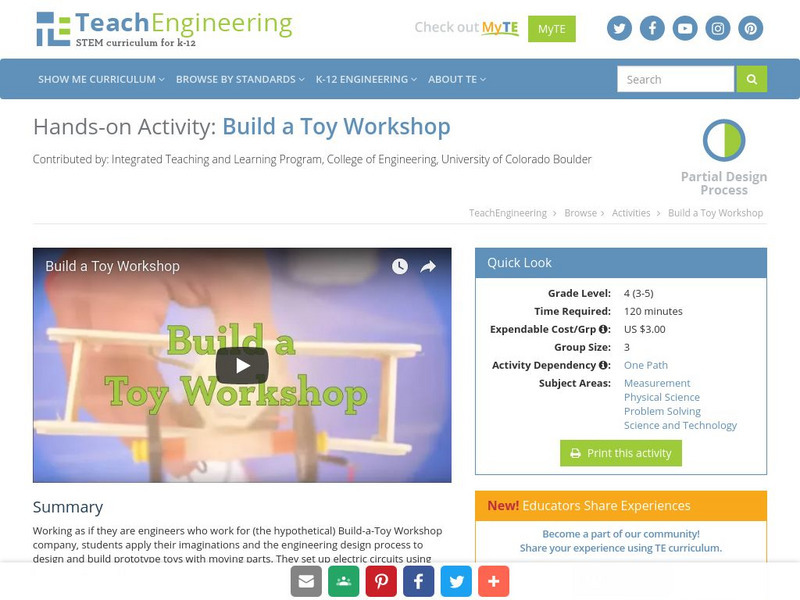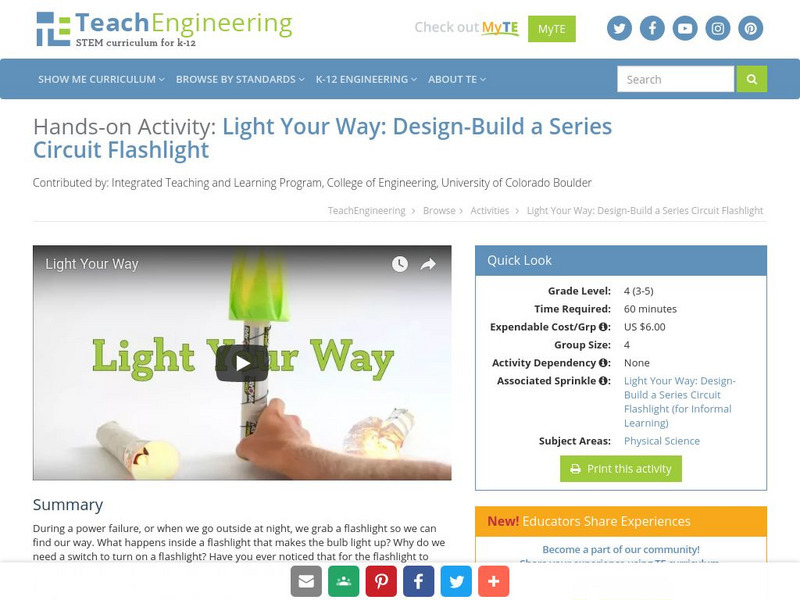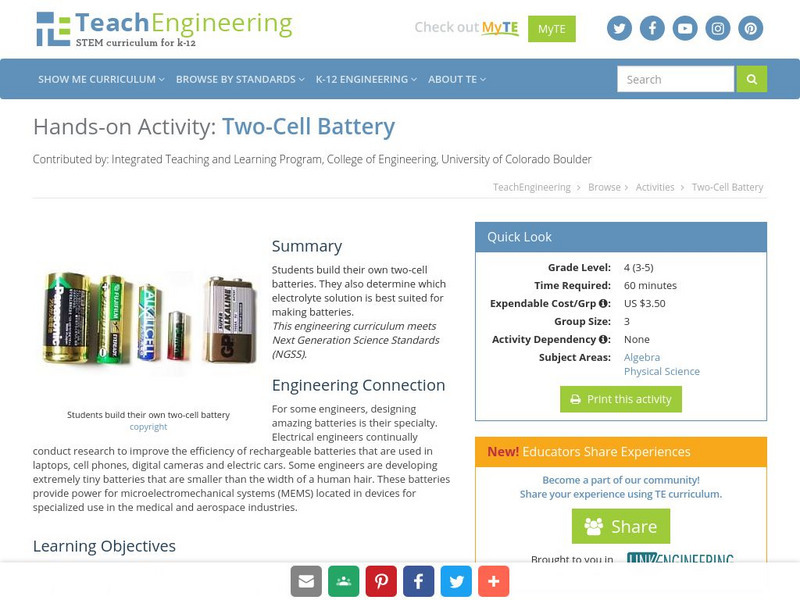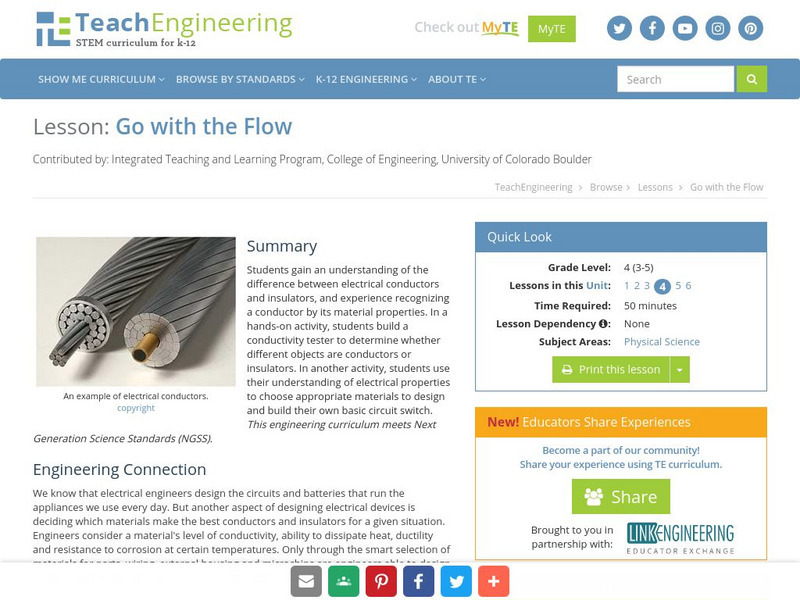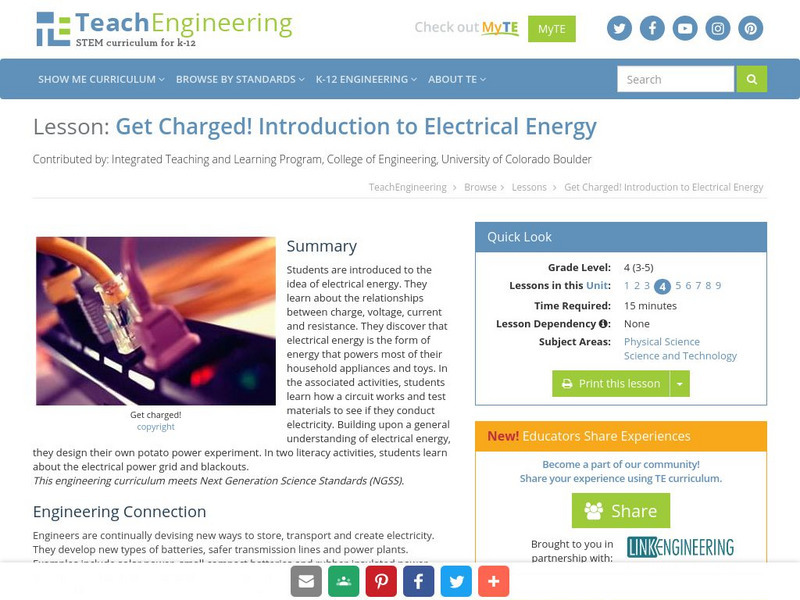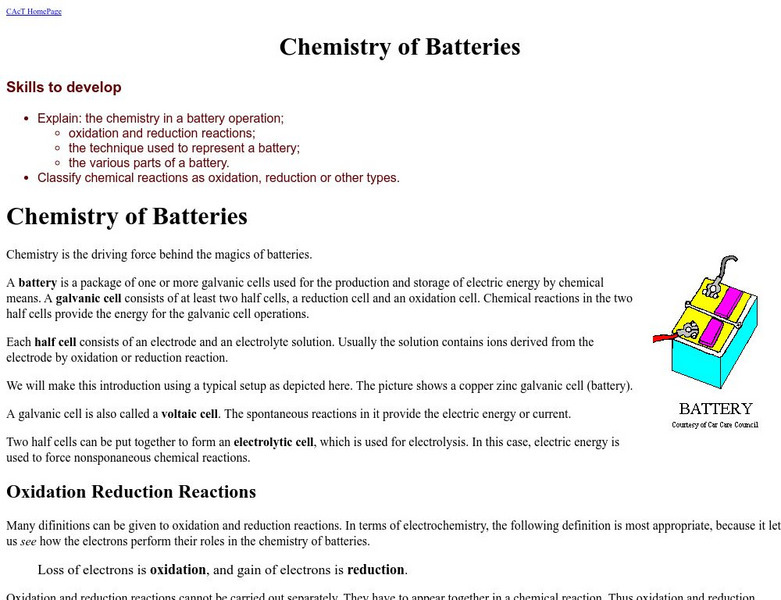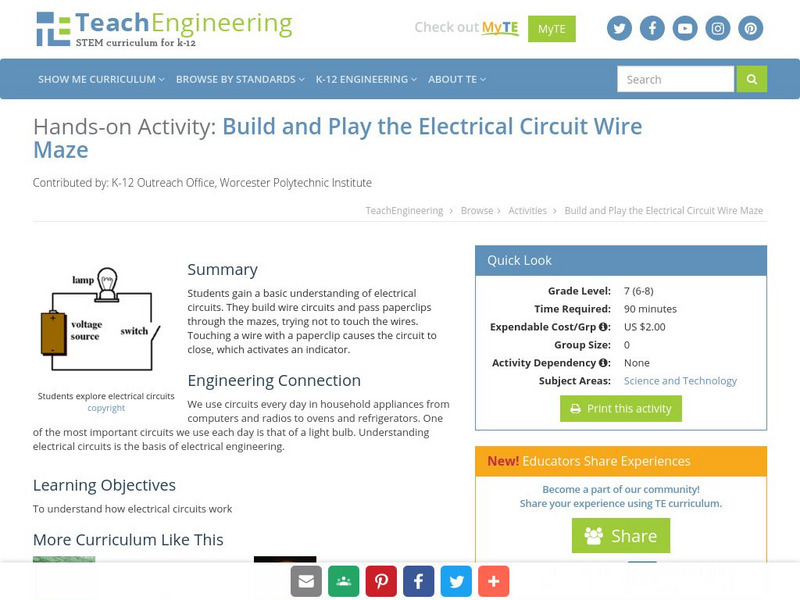Khan Academy
Khan Academy: Electrical Engineering: Circuit Analysis
Circuit analysis is the process of finding all the currents and voltages in a network of connected components. We look at the basic elements used to build circuits, and find out what happens when elements are connected together into a...
Khan Academy
Khan Academy: Basic Electrical Quantities: Current, Voltage, Power
Build an intuitive understanding of current and voltage, and power.
Science Education Resource Center at Carleton College
Serc: Investigating Batteries: Building an Electrolytic Cell
In this inquiry, students will attempt to build an electrolytic cell which will cause a bulb to turn on then diagram the set-up. Included in this lab, students will experience voltage, solve a problem using the Nernst equation, and...
TeachEngineering
Teach Engineering: Designing a Thermostat
Students investigate circuits and their components by building a basic thermostat. They learn why key parts are necessary for the circuit to function, and alter the circuit to optimize the thermostat temperature range. They also gain an...
PBS
Pbs Kids: Design Squad Challenge: Dance Pad Mania (Pdf) [Pdf]
Hands-on challenge to build a dance pad that lets you use your feet to either flash a light or to sound a buzzer. Provides full list of materials with ideas on how to design, build, test, and redesign the pad if necessary. Activity...
TeachEngineering
Teach Engineering: Electrocardiograph Building
This activity will build upon the concepts taught in the lesson The Strongest Pump of All. The activity will pull together the concepts of bioelectricity, electrical circuits, and biology. It will allow the students the opportunity to...
TeachEngineering
Teach Engineering: Build a Toy Workshop
Working as if they are engineers who work for (the hypothetical) Build-a-Toy Workshop company, students apply their imaginations and the engineering design process to design and build prototype toys with moving parts. They set up...
Science Buddies
Science Buddies: Build a Mini Led Lightsaber
Build your own mini LED lightsaber with a straw in this quick Star Wars-themed STEM activity.
Technovation
Curiosity Machine: Challenges: Engineer an Electric Switch
Using your knowledge of the flow of electricity, do you think you could build a switch that can complete a circuit to turn on an LED? This site contains the challenge, tips, a lesson plan, and a place for students to document their...
Science Museum, London
Science Museum: Robot Bugs
Build a robot and watch how it moves. Activity is designed to help students learn how electrical circuits and switches control how things move.
Khan Academy
Khan Academy: Electrical Engineering: Amplifiers
Amplifiers make signals bigger. Amplification is often the most basic operation of an electronic circuit. There are many kinds of amplifier designs. We will describe the operational amplifier, the building block of most analog electronics.
Science Buddies
Science Buddies: Where There Is Charge, There Can Be Sparks!
In this short science project you will learn how to build a capacitor using common household items. By testing different charge cycles, you will work to discover how much charge is stored in a Leyden jar capacitor.
TeachEngineering
Teach Engineering: How Does a Robot Work?
This lesson introduces electricity, batteries and motors using a LEGO MINDSTORMS NXT robot. The associated activity guides learners to build a simple LEGO NXT set-up and see the practical implementation of the concepts discussed. Before...
ClassFlow
Class Flow: Circuit Conductors
[Free Registration/Login Required] This unit builds on children's previous practical experience of making circuits and extends their understanding of circuits, conductors and insulators and the need for a complete circuit in order for a...
TeachEngineering
Teach Engineering: Light Your Way
When there is a power failure, or when we go outside at night, we grab a flashlight so we can find our way. What happens inside a flashlight that makes the bulb light up? Why do we need a switch to turn on a flashlight? Have you ever...
TeachEngineering
Teach Engineering: Simple Coulter Counter
Students build and use a very basic Coulter electric sensing zone particle counter to count an unknown number of particles in a sample of "paint" to determine if enough particles per ml of paint exist to meet a quality standard. In a lab...
Science Buddies
Science Buddies: Solar Cell Power Output vs. Temperature
Solar cells provide a clean way of making electricity directly from sunlight. In this project you will build a simple circuit and experimental setup to investigate whether the power output of a solar cell changes with ambient temperature.
TeachEngineering
Teach Engineering: Two Cell Battery
In this hands-on activity, students build their own two-cell battery. They also determine which electrolyte solution is best suited for making a battery.
Curated OER
Electricity: Simple Circuits
Create your own simple electric circuit. Using simple supplies build your own battery and investigate conductivity. You can also construct a crossword puzzle with electrical vocabulary words.
TeachEngineering
Teach Engineering: Go With the Flow
Students gain an understanding of the difference between electrical conductors and insulators, and experience recognizing a conductor by its material properties. In a hands-on activity, students build a conductivity tester to determine...
TeachEngineering
Teach Engineering: Bulbs & Batteries in a Row
Everyday we are surrounded by circuits that use "in parallel" and "in series" circuitry. Complicated circuits designed by engineers are composed of many simpler parallel and series circuits. During this activity, students build a simple...
TeachEngineering
Teach Engineering: Get Charged!
Students are introduced to the idea of electrical energy. They learn about the relationships between charge, voltage, current and resistance. They discover that electrical energy is the form of energy that powers most of their household...
University of Waterloo (Canada)
Computer Assisted Chem. Tutorial/chemistry of Batteries
A superb explanation of how a battery works. Discusses the associated chemistry which explains how a battery produces a voltage. Includes a series of "Confidence Building Questions."
TeachEngineering
Teach Engineering: Wire Maze
Students will build a wire circuit and pass a paperclip through the maze, trying not to touch the wire. Touching the wire with the paperclip will cause the circuit to close, which will activate the indicator.



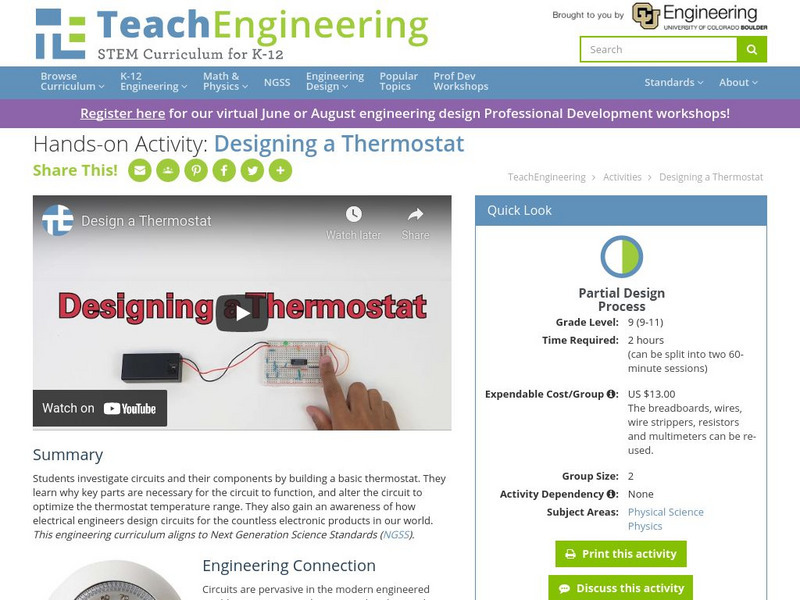
![Pbs Kids: Design Squad Challenge: Dance Pad Mania (Pdf) [Pdf] Handout Pbs Kids: Design Squad Challenge: Dance Pad Mania (Pdf) [Pdf] Handout](https://content.lessonplanet.com/knovation/original/39874-4adfadd8b52b66e71cac53cd55883d55.jpg?1661243850)

